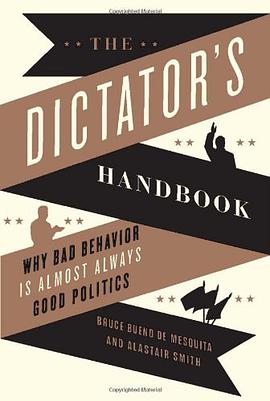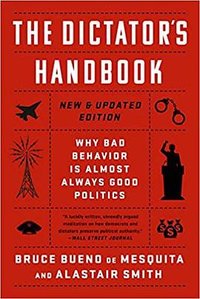
Why Bad Behavior is Almost Always Good Politics
Bruce Bueno de Mesquita / Alastair Smith
简介
In this title, two renowned political scientists make the contrarian, research-based case that - regardless of any other factors political scientists or historians may find relevant - the calculations and actions of rulers are the driving force of all politics, and the primary goal of rulers is to maintain power as long as possible. In this clever and accessible book, Bueno de Mesquita and Smith introduce us to their perspective of the political world. They bare the logic of politics, starting from the simple premise that leaders pursue their own ends, and that populations either have, or more often don't have, the power to constrain them to a significant degree. The book is organized by a series interconnected questions, among them: Why do leaders who wreck their countries keep their jobs for so long? Why do autocracies have dismal economic policies? How are there so many suffering people in resource-rich lands? Why do 'natural disasters' disproportionately strike poor nations? Why do 'evil-doers' so often collect loads of foreign aid? Why are democracies so good at war? In answering these questions, the authors look at politics, the choices of public policies, and even decisions about war and peace as lying outside of conventional thinking about culture and history. They set aside ideas of civic virtue and psychopathology. Such notions simply are not central to understanding what leaders do and why they do it. Instead, Bueno de Mesquita and Smith see politicians as self-interested louts, just the sort of people you wouldn't want to have over for dinner, but without whom you might not have dinner at all. And from this perspective, they are able to answer some perplexing mysteries of politics, shed light on what we read in the newspapers every single day, and offer realistic ways of improving human governance.
contents
Introduction
Rules to Rule By
Chapter 1 - The Rules of Politics
Three Political Dimensions
Virtues of 3 - D Politics
Change the Size of Dimensions and Change the World
Rules Ruling Rulers
Taxing
Shuffling the Essential Deck
Do the Rules Work in Democracies?
Chapter 2 - Coming to Power
Paths to Power with Few Essentials
Speed Is Essential
Pay to Play
Mortality: The Best Opportunity for Power
Inheritance and the Problem of Relatives
Papal Bull - ying for Power
Seizing Power from the Bankrupt
Silence Is Golden
Institutional Change
Coming to Power in Democracy
Democratic Inheritance
Democracy Is an Arms Race for Good Ideas
Coalition Dynamics
A Last Word on Coming to Power: The Ultimate Fate of Sergeant Doe
Chapter 3 - Staying in Power
Governance in Pursuit of Heads
The Perils of Meritocracy
Keep Essentials Off-Balance
Democrats Aren’t Angels
Bloc Voting
Leader Survival
Chapter 4 - Steal from the Poor, Give to the Rich
Taxation
Tax Collectors
Privatized Tax Collection
Extraction
Borrowing
Debt Forgiveness
Chapter 5 - Getting and Spending
Effective Policy Need Not Be Civic Minded
Bailouts and Coalition Size
Is Democracy a Luxury?
Public Goods Not for the Public’s Good
Who Doesn’t Love a Cute Baby?
Clean Drinking Water
Building Infrastructure
Public Goods for the Public Good
Earthquakes and Governance
Chapter 6 - If Corruption Empowers, Then Absolute Corruption Empowers Absolutely
Power and Corruption
Private Goods in Democracies
Private Goods in Small Coalition Settings
Wall Street: Small Coalitions at Work
Dealing with Good Deed Doers
Cautionary Tales: Never Take the Coalition for Granted
Discretionary Money
Chapter 7 - Foreign Aid
The Political Logic of Aid
The Impact of Aid
An Assessment of Foreign Aid
Aid Shakedowns
Fixing Aid Policy
Nation Building
Chapter 8 - The People in Revolt
To Protest or Not To Protest
Nipping Mass Movements in the Bud
Protest in Democracy and Autocracy
Shocks Raise Revolts
Are Disasters Always Disasters for Government Survival?
Responding to Revolution or Its Threat
Power to the People
Chapter 9 - War, Peace, and World Order
War Fighting
To Try Hard or Not
Fighting for Survival
Who Survives War
The Peace Between Democracies
Defending the Peace and Nation Building
Chapter 10 - What Is To Be Done?
Rules to Fix By
Lessons from Green Bay
Fixing Democracies
Removing Misery
Free and Fair Elections: False Hope
Acknowledgments




